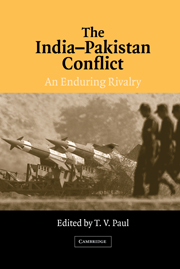Book contents
- Frontmatter
- Contents
- List of figures and tables
- Notes on contributors
- Acknowledgments
- Map: Jammu and Kashmir
- Part I Introduction
- Part II Theories of enduring rivalry and the South Asian conflict
- Part III Roots of the India–Pakistan conflict
- 6 Major powers and the persistence of the India–Pakistan conflict
- 7 Nuclear weapons and the prolongation of the India–Pakistan rivalry
- 8 National identities and the India–Pakistan conflict
- 9 At the heart of the conflict: irredentism and Kashmir
- 10 Institutional causes of the India–Pakistan rivalry
- Part IV Conclusion
- Index
9 - At the heart of the conflict: irredentism and Kashmir
Published online by Cambridge University Press: 30 November 2009
- Frontmatter
- Contents
- List of figures and tables
- Notes on contributors
- Acknowledgments
- Map: Jammu and Kashmir
- Part I Introduction
- Part II Theories of enduring rivalry and the South Asian conflict
- Part III Roots of the India–Pakistan conflict
- 6 Major powers and the persistence of the India–Pakistan conflict
- 7 Nuclear weapons and the prolongation of the India–Pakistan rivalry
- 8 National identities and the India–Pakistan conflict
- 9 At the heart of the conflict: irredentism and Kashmir
- 10 Institutional causes of the India–Pakistan rivalry
- Part IV Conclusion
- Index
Summary
Introduction
The enduring conflict between India and Pakistan may be moving towards a period of détente. The leaders of both countries met at the outset of 2004, essentially agreeing that the Kashmir conflict should be handled peacefully. This might be a cause of great optimism. One of the key sources of conflict in their relationship – Pakistan's irredentism and India's resistance – may be declining. However, at the same time, there have been repeated efforts to assassinate General Pervez Musharraf by forces that oppose moderation. The simultaneity of these two sets of events is suggestive – that there are grave domestic costs for making peace, and that Musharraf, if sincere, may be following Anwar Sadat more closely than he would like. This brings us to a key shortcoming of the enduring rivalry literature – domestic politics matters but is undertheorized. That is, domestic politics seems to do a lot of the work of causing, prolonging, and ending rivalries, but most scholars in this debate treat it in an ad hoc fashion. By focusing on the largely domestic dynamics that drive irredentism, we can get a better idea of under what conditions many rivalries will begin, worsen, and perhaps even end.
Not all enduring rivalries have irredentism as a core dynamic, but many do, including the Koreas, Somalia and Ethiopia, and China and Taiwan.
- Type
- Chapter
- Information
- The India-Pakistan ConflictAn Enduring Rivalry, pp. 202 - 224Publisher: Cambridge University PressPrint publication year: 2005
- 6
- Cited by



